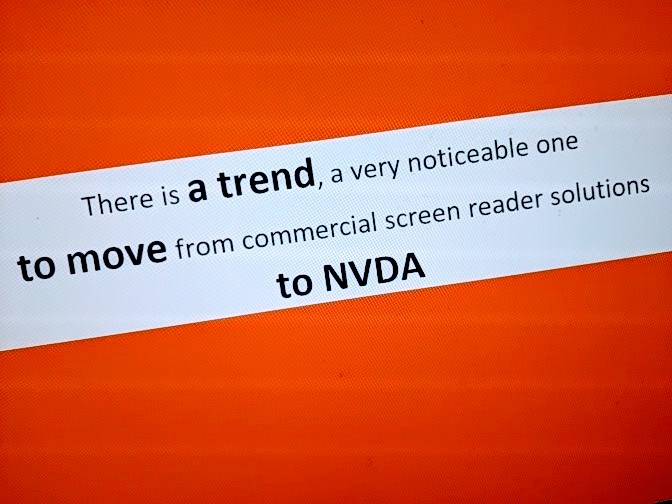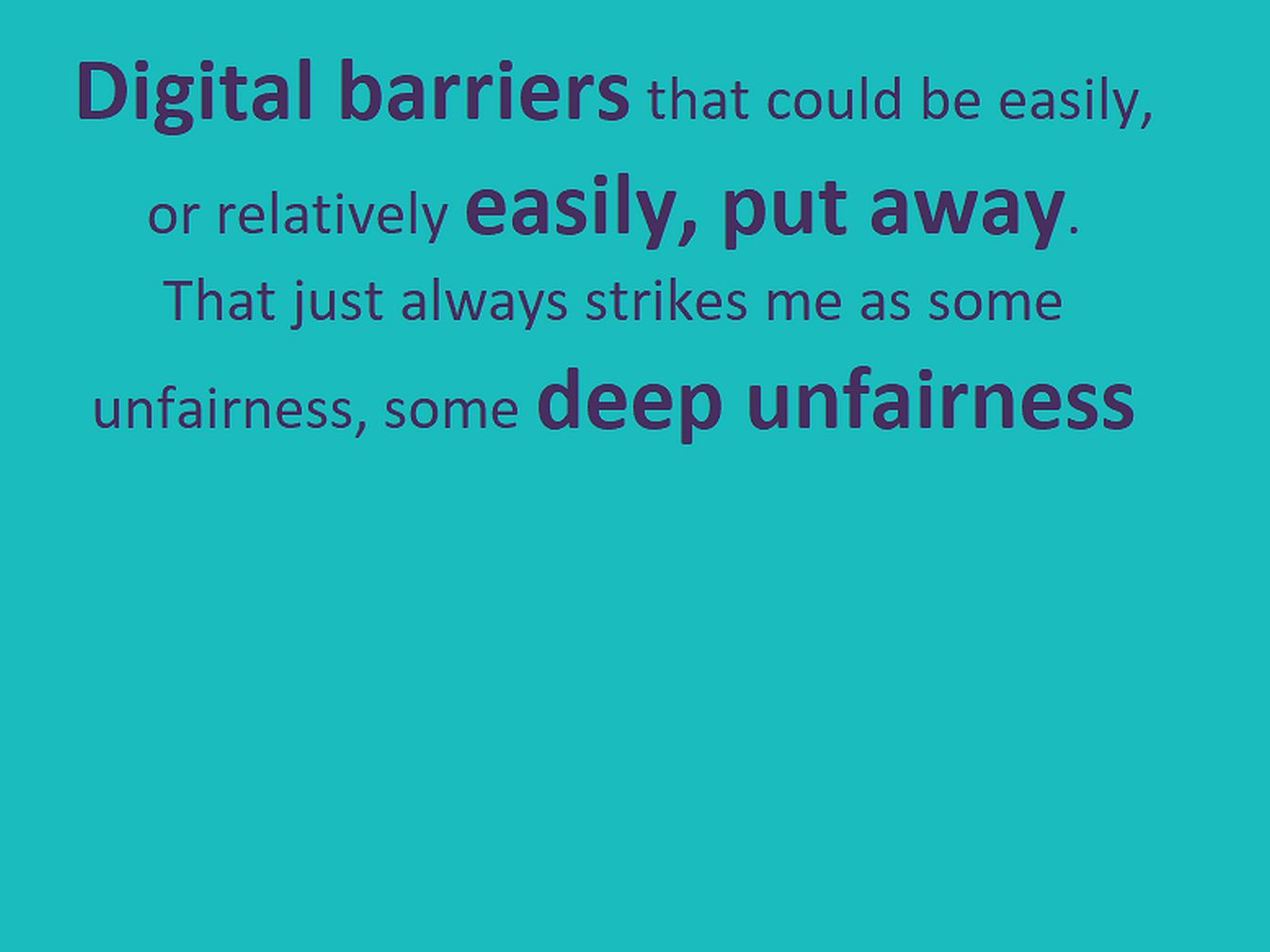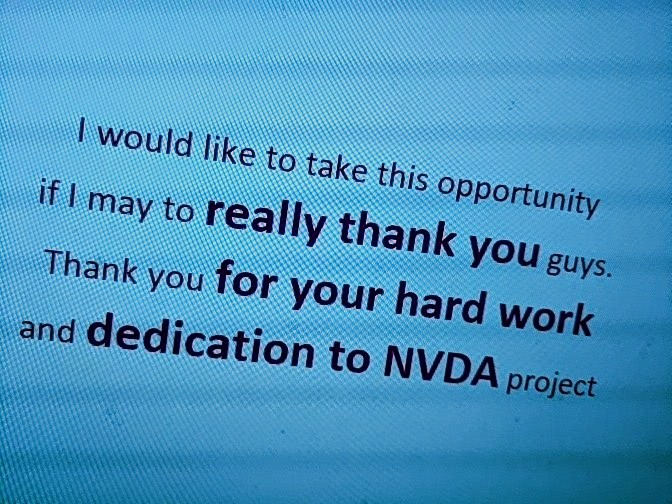Anatoliy Popko is a well-known Russian accessibility expert. Recently, Quentin had the opportunity to chat with him and find out about some of the exciting projects he is involved with. The interview is available as a video, with the transcript of the conversation below that.
Quentin: Anatoliy Popko, tell me a little bit about yourself
Anatoliy: Well the difficult part about that question is a little bit. 38, totally blind, NVDA user for last 4 years plus something. And I’ve been always very loud and articulate about the accessibility, digital accessibility here in Russia. I live in Moscow; I am one of the co-authors of Russian digital accessibility standards. We took WCAG 2.1 and basically translated it into Russian and there now since April 1st, 2020, it was enacted. So, it is an official document now, and I take a little bit of pride that I was a tiny part of that accessibility movement. And, of course, I help Russian charities to run various projects related to blind and vision impaired users. And one of them does require NVDA certification, so that is cool.
Quentin: That is cool. So why are you using NVDA certification? What do you have Russian certified NVDA users for?
Anatoliy: Well, actually, there is a very strong Russian speaking community of blind and vision impaired users. There is a trend, a very noticeable one, to move from commercial screen reader solutions to NVDA. So, I would assume, I don’t have any exact figures, but my estimation is that NVDA is the primary screen reader for the majority of the Russian blind computer windows computer users.

Text: “There is a trend, a very noticeable one, to move from commercial screen reader solutions to NVDA”, in purple on a white block, on an orange background.
There is a fund, and the fund is called Arts science and sports. And one of its programs or subdivisions is called special view. Those wonderful ladies behind special view. They came to me and tried to address me with a question if there is anything that I would do, having the resources, for blind and vision impaired community in Russia, and especially in terms of computer skills, so to say. And yes, I came up with the idea to actually unite a few prominent Russian IT trainers, because I know a lot of them throughout Russia and to start one on one distance learning sessions trying to actually expand the current level of expertise and knowledge of using the technology. Because you know I also run the dialog in the dark project and I really hate it when blind people avoid using various technology which they could have been using. But they just avoid it for some reasons that they don’t know how to use it and that really decreases their performance and that annoys me enormously. I just think that something needs to be done about that
Quentin: You said NVDA is now the most popular screenreader in Russia. Do you know why that is? Is it a cost issue?
Anatoliy: One of the major issues, it is cost related, yes. NVDA is actually a good product. It has updates, three or four updates per year. It runs fast, and there’s really no point in not using it. That’s the key I guess.
NVDA is actually a good product… It runs fast, and there’s really no point in not using it.
Quentin: You mentioned the Dialog in the Dark. Tell me a little bit more about Dialog in the Dark.
Anatoliy: Dialog in the Dark has a few formats. So one of them is business workshops, where sighted persons are taking to the complete darkness, and they conduct a real business workshop to develop their soft skills, so that is the key objective. And another type of events is exhibition. So, there is a specially darkened space. Sighted people enter it and of course they instantly stop seeing, stop relying on their vision, which usually provides up to 80 or more percent of the information about their surroundings. So then they have to cope anyhow with the reality. While in exhibition they go from one location to the other and then the locations may vary a lot. So there is a street, there’s a park, there is a summer house, there is a maybe a short trip on a boat with real water outside and they go to some bar buy some soda or snacks, and that is an hour long journey. Once they come out they have a chance to talk to the blind guide, their guide, to ask whatever questions might arise out of their experience and that is also something very important as a as important as personal experience can be.
Quentin: Fantastic, and you’re also involved in G3ICT’s Smart Cities for All.
Anatoliy: A little bit, yes. Because I’m trying to push Russian IT community for greater digital accessibility, and those efforts were recognised by G3ICT and smart cities for all program and they approached me and asked if I would be willing to take my efforts on the next level. I happily agreed, and after the interview, they accepted me in their country representatives. So I am representing Russia.
I’m trying to push Russian IT community for greater digital accessibility, and those efforts were recognised by G3ICT.
I really am a vocal person. I try to be reasonable and sensible but when I see how much blind and vision impaired people can do and the only reason why they aren’t doing that is just digital barriers that could be easily, or relatively easily put away. That just always strikes me as some unfairness, some deep unfairness on a very deep level and I start to ask, to convince people to make their product accessible and actually to get them acquainted with screenreading software. I always say, well if you use Windows then just download NVDA screenreader. If you use any other platform like maybe MacOS then press command+F5 key. Just take a look at how it’s working, and yeah, so far I’d say there have been a few successes on that way, so we’re moving forward.

Text: “Digital barriers that could be easily, or relatively easily, put away. That just always strikes me as some unfairness, some deep unfairness” in purple on turquoise.
If you use Windows then just download NVDA screenreader.
Quentin: Fantastic. Moving forward, that’s good! So that brings us back to your project, working for the Arts, Science and Sports foundation charity, as the accessibility consultant for the Special View program.
Anatoliy: Yep, and so the idea behind the project is to actually get together those users, blind and vision impaired users who want to expand their knowledge, their IT related skills, and those blind and vision impaired IT trainers who can provide, who can teach how to use the computer and that’s the idea behind it. And one of the questions which arises right away: How can be we sure that those IT trainers, themselves have the expertise and knowledge that they can use the computers, good enough? And NVDA Certification became one of the first challenges for those IT specialists to overcome. Because that was a challenge.
How can we be sure that those IT trainers, themselves have the expertise and knowledge that they can use the computer, good enough? NVDA Certification.
That was the first thing I myself did. I passed the exam and thought that it was mildly difficult. Well it was difficult, but not so much, and I thought that OK well if IT trainers who would teach blind and vision impaired community in Russia would have this internationally recognised certification, that would be just cool. So, I kind of set that as an entry barrier. So those people who want to train others, have to pass the exam.
Because they live all across Russia and I think only one of them is in Moscow so all the others, all the other 10 are located in various other cities from Kaliningrad to Vladivostok. And everywhere in between, in any cities.
They were passing the exam. I really am proud to say 11 of my peers, totally blind, Russian speaking and Russian living users, NVDA users, have been able to pass the exam. And actually, a little more because, when I shared what I was doing with friends of mine, because I have a lot of blind and visually impaired friends, all over Russia, even those who didn’t, who weren’t particularly interested in becoming an IT trainer, they were like “ah , what do you say, they NVDA certification system?, Aha, ok, and I know for sure at least a couple of guys who are not directly engaged in my project, they also went to NVDA certification system and passed the exam. Just to make sure that their knowledge of the best screenreader for Windows platform is sufficient enough just to get self-esteem, that’s funny!
Passed the exam. Just to make sure that their knowledge of the best screenreader for Windows platform is sufficient enough.
Quentin: That’s fantastic, and it really goes to show the dedication of the people you’ve got working with you there So the project that you’ve got started there, to teach others. What will you be teaching?
Anatoliy: The topic range is actually quite extensive. Because there is not only Windows OS itself, basic function like changing options and using file explorer, this kind of stuff but there’s also of course various internet related functions starting with internet browsing, email clients then of course there is Skype, Zoom and all those communication systems, and then there is a huge block related to Google applications, Google suite, Google documents, Google sheets, Google calendar, tasks, Gmail itself, whatever because like those pieces of software they are being used in corporate environment just about everywhere and if there is a chance, a possibility for employment for a blind and visually impaired person, then those tools are a must to master, so to say. There is no way of avoiding this kind of software. And of course, we also, are aiming at providing some knowledge for Mac OSX operating system, and we even want to go as far as to start actually to support Blind and visually impaired freelancers who want to organise and to create their own websites so using some content management system like WordPress, Drumola, Joomla, Drupal or whatever, you name it. That is going to be the real help to blind and vision impaired Russian community because they would have access to the knowledge and expertise of IT of prominent IT Russian trainers. Those IT trainers who are blind and vision impaired persons themselves they would get an opportunity for vocational employment. So they would be able to earn some money. And those corporate structures that are responsible enough to hire blind and visually impaired persons, they can just address that project with a proposal to train their blind personnel to use the software so they wouldn’t have any more doubts than necessary, if this blind person can use this particular software. I think also that might also be important.
If there is a chance, a possibility for employment for a blind or visually impaired person, then those tools are a must to master.
But the idea behind the project is that the charity foundation actually covers the costs of training sessions. So it pays to the IT trainers and blind and vision impaired users receive knowledge free of charge you know only the only requirements are their basically their motivation. So hopefully that would give opportunities to those people who can not really get hold of any substantial knowledge for their education or employment otherwise.
Quentin: Definitely, and that ties in with our own philosophy at NV Access, that the cost for a blind user to be able to use the computer should be no more than for anybody else. Which is exactly why we make NVDA available for free to begin with.
Anatoliy: Yep, and I would like to take this opportunity if I may to really thank you guys. Thank you for your hard work and dedication to NVDA project. Because it’s been evolving rapidly, and the work you’re doing is really fantastic and I’m sure there is a lot of Russian, well I know for sure that there is just hundreds, if not thousands of blind Russian users that would gladly say thank you for your work for your dedication for your NVDA because it really does make a lot of difference in how we use computers. Why we use, where we use them. It does open doors for education, for employment and it kind of like lays the foundation for us to start talking about digital accessibility because like right now we can address all the interested developers. Ok take a look at NVDA website and just download that free screen reader software and just run it. See for yourself what your website or your application looks like. And we can use it just freely on any computer and that, that’s a lot. That really does make a huge difference. That motivates at least me to talk about digital accessibility to push the corporate environment, the IT developers forward and to you know create even more education and employment opportunities for the blind and vision impaired, that’s what we’re doing here. That’s important.

Text “I would like to take this opportunity if Imay to really thank you guys. Thank you for your hard work and dedication to NVDA project” in purple on turquoise.
Quentin: That is important and that’s a really fantastic initiative that you’ve got going there.
Anatoliy: Well thank you.
Quentin: And thank you.